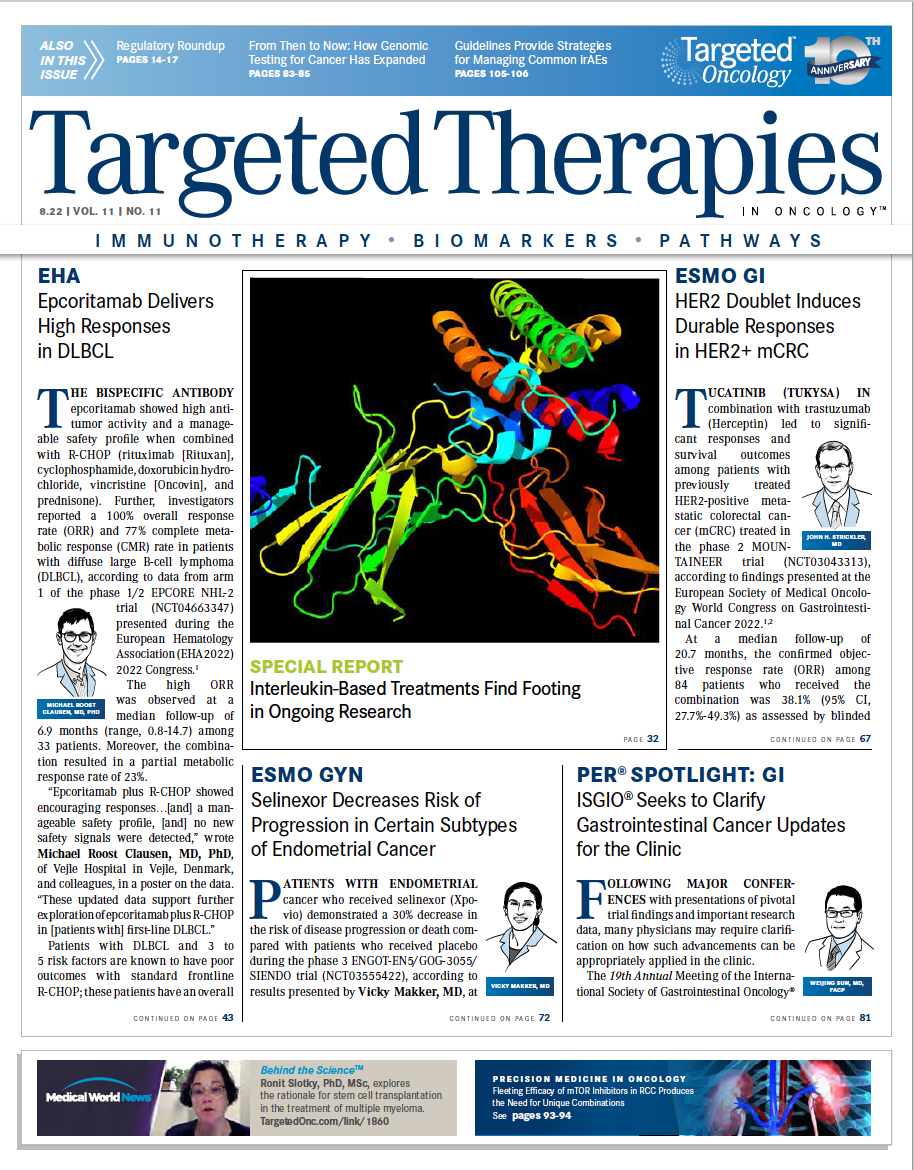ISGIO® Seeks to Clarify Gastrointestinal Cancer Updates for the Clinic
During the Annual Meeting of the International Society of Gastrointestinal Oncology, experts in the field and investigators from pivotal studies will elucidate how these advances can be used to guide treatment, and how to choose between available treatments in specific patient populations.
Weijing Sun, MD, FACP

Following majors conferences with presentations of pivotal trial findings and important research data, many physicians may require clarification on how such advancements can be appropriately applied in the clinic. The 19th Annual Meeting of the International Society of Gastrointestinal Oncology® (ISGIO®), hosted by Physicians’ Education Resource®, LLC (PER®), seeks to help oncologists do just that. During the meeting, experts in the field and investigators from pivotal studies will elucidate how these advances can be used to guide treatment and how to choose between available treatments in specific patient populations, which, according to ISGIO® president Weijing Sun, MD, FACP, is the major purpose of the meeting.
Clarifying ASCO’s Impact on the GI Clinic
The meeting, which will take place Friday, September 30, 2022, through Saturday, October 1, 2022, both virtually and at the Loews Vanderbilt Hotel in Nashville, Tennessee, will address many of the advances in gastrointestinal (GI) malignancies highlighted at the recent American Society of Clinical Oncology (ASCO) Annual Meeting and help put these updates into context of how they should be applied in the clinic.
“There were a lot of advances in the colorectal cancer [field] after [being quiet for] quite a few years,” Sun said in an interview with Targeted Therapies in Oncology™. Sun is the Sprint Professor of Medical Oncology, a professor of medical oncology and cancer biology, director of the Division of Medical Oncology at the University of Kansas School of Medicine, and associate director of the University of Kansas Cancer Center in Kansas City.
He addressed the late-breaking phase 3 PARADIGM trial (NCT02394795) of panitumumab (Vectibix) vs bevacizumab (Avastin) with first-line chemotherapy in patients with RAS wild-type metastatic colorectal cancer originating on the left side of the colon.1 Sun explained that the study confirmed, in a large trial, information that was previously known from retrospective data from several prior studies that patients with RAS wild-type metastatic colorectal cancer and primary left-sided disease benefit more from anti-EGFR therapy plus chemotherapy than anti-VEGF therapy with chemotherapy. “In the clinic, [this is] very important information,” he said, because it provides a standard treatment approach for this patient population.
Findings from the PARADIGM study showed a median overall survival of 37.9 months (95.798% CI, 34.1-42.6) with frontline panitumumab plus mFOLFOX6 (modified fluorouracil, leucovorin, and oxaliplatin) chemotherapy compared with 34.3 months (95.798% CI, 30.9-40.3) with bevacizumab and mFOLFOX6 (stratified HR, 0.82; 95.798% CI, 0.68-0.99; P = .031).
Also presented at ASCO 2022, results from the DYNAMIC study showed the benefit of circulating tumor DNA (ctDNA) analysis in guiding therapy selection for patients with stage II colorectal cancer.2,3 Patients who were ctDNA negative were able to safely forgo adjuvant chemotherapy, and those who were ctDNA positive with micrometastatic disease received chemotherapy. The 2-year recurrence-free survival rate in patients who skipped chemotherapy was 93.5% vs 92.4% in the chemotherapy group. Sun said ctDNA could be very helpful for guiding clinical assessment and clinical decision-making.
Another significant advance that Sun highlighted from ASCO 2022 was the use of dostarlimab-gxly (Jemperli) in patients with stage II/III mismatch repair–deficient locally advanced rectal cancer in a small phase 2 trial (NCT04165772).4,5 All 12 patients achieved a complete clinical response to treatment with the immune checkpoint inhibitor (ICI) (objective response rate, 100%; 95% CI, 74%-100%), and at the time of data cutoff, no cases of progression or recurrence were reported.
Sun said the study findings were very encouraging and surprising to many but require verification in larger trials, adding that they could be practice changing for this patient population if validated. These updates from the ASCO meeting will be addressed on the second day of ISGIO® (see AGENDA).
Ongoing Areas of Research
Other areas of discussion at the ISGIO® meeting will include a session on old and new targets in biliary tract cancers, an active area of research according to Sun. The session will be presented by Milind Javle, MD, a professor in the Department of GI Medical Oncology at The University of Texas MD Anderson Cancer Center in Houston.
Sun explained that information is already known about molecular markers for cholangiocarcinoma, such as FGFR2 and IDH1 mutations. Agents directed against these mutations have already been approved by the FDA, including infigratinib (Truseltiq), which was approved on May 28, 2021, to treat patients with previously treated unresectable locally advanced or metastatic cholangiocarcinoma harboring an FGFR2 fusion or rearrangement,6 and ivosidenib (Tibsovo), approved on August 25, 2021, for adult patients with previously treated locally advanced or metastatic cholangiocarcinoma and an IDH1 mutation.7
Investigators are continuing to explore other ways that treatment for patients with cholangiocarcinoma can be further personalized based on other molecular markers. Newer targets being considered for cholangiocarcinoma include ERBB, EGFR, and MEK.8

Another active area of investigation that Sun mentioned is the use of adjuvant or neoadjuvant immunotherapy for the treatment of patients with esophageal cancer. It was a significant advancement in the esophageal field when ICIs were first approved. Going forward, several phase 2 and 3 studies are being conducted to explore how ICIs, with or without chemotherapy, can be moved into the neoadjuvant setting for patients with esophageal cancer. One such phase 2/3 study (NCT05213312) is looking at the use of neoadjuvant nivolumab (Opdivo) with investigator’s choice of chemotherapy, followed by surgery and adjuvant nivolumab for patients with resectable esophageal squamous cell carcinoma.
Engaging With Fellows and Faculty
A second purpose of the meeting, according to Sun, is to educate members of the cancer care team and engage with junior faculty members in discussions of patient cases. Sun hopes that such discussions will help encourage the next generation of GI oncologists, the future experts in the field, a purpose Sun is quite passionate about.
As director of the Division of Medical Oncology, Sun helps guide the next generation of medical oncologists at the University of Kansas School of Medicine. He believes that it is vital to train and mentor younger physicians for their career development and that ISGIO® plays a key part in that development. As such, registration fees to the ISGIO® meeting for residents, fellows, nurses, and other health care professionals are discounted. During the meeting, all are encouraged to participate in case discussions and to ask questions.
References:
1. Yoshino T, Watanabe J, Shitara K, et al. Panitumumab (PAN) plus mFOLFOX6 versus bevacizumab (BEV) plus mFOLFOX6 as first-line treatment in patients with RASwild-type (WT) metastatic colorectal cancer (mCRC): results from the phase 3 PARADIGM trial. J Clin Oncol. 2022;40(suppl 17):LBA1. doi:10.1200/JCO.2022.40.17_suppl.LBA1
2. Tie J, Cohen JD, Lahouel K, et al. Adjuvant chemotherapy guided by circulating tumor DNA analysis in stage II colon cancer: the randomized DYNAMIC trial. J Clin Oncol. 2022;40(suppl 17):LBA100. doi:10.1200/JCO.2022.40.17_suppl.LBA100
3. Tie J, Cohen JD, Lahouel K, et al; DYNAMIC Investigators. Circulating tumor DNA analysis guiding adjuvant therapy in stage II colon cancer. N Engl J Med. 2022;386(24):2261-2272. doi:10.1056/NEJMoa2200075
4. Cercek A, Lumish MA, Sinopoli JC, et al. Single agent PD-1 blockade as curative-intent treatment in mismatch repair deficient locally advanced rectal cancer. J Clin Oncol.2022;40(suppl 17):LBA5. doi:10.1200/JCO.2022.40.17_suppl.LBA5
5. Cercek A, Lumish M, Sinopoli JC, et al. PD-1 blockade in mismatch repair-deficient, locally advanced rectal cancer. N Engl J Med.2022;386(25):2363-2376. doi:10.1056/NEJMoa2201445
6. FDA grants accelerated approval to infigratinib for metastatic cholangiocarcinoma. FDA. Updated May 28, 2021. Accessed July 25, 2022. https://bit.ly/3vkbTXc
7. FDA approves ivosidenib for advanced or metastatic cholangiocarcinoma. FDA. Updated February 1, 2022. Accessed July 25, 2022. https://bit.ly/3OwSDfD
8. Li Y, Song Y, Liu S. The new insight of treatment in cholangiocarcinoma. J Cancer. 2022;13(2):450-464. doi:10.7150/jca.68264

Pembrolizumab/Trastuzumab/Chemo Enhances Survival in HER2+ Gastric Cancer
May 1st 2024The combination of pembrolizumab, trastuzumab, and chemotherapy showed significant improvement in overall survival vs placebo in patients with HER2-positive advanced gastric or gastroesophageal junction adenocarcinoma.
Read More
Gholam Analyzes Treatment Outcomes for Advanced HCC in Child-Pugh B Population
April 28th 2024During a live Community Case Forum event in partnership with the Tennessee Oncology Practice Society, Pierre Gholam, MD, examined the current state of treatment for patients with hepatocellular carcinoma, looking in particular at what data is available for those with Child-Pugh B and C status who have poorer outcomes and have limited data from prospective clinical trials.
Read More